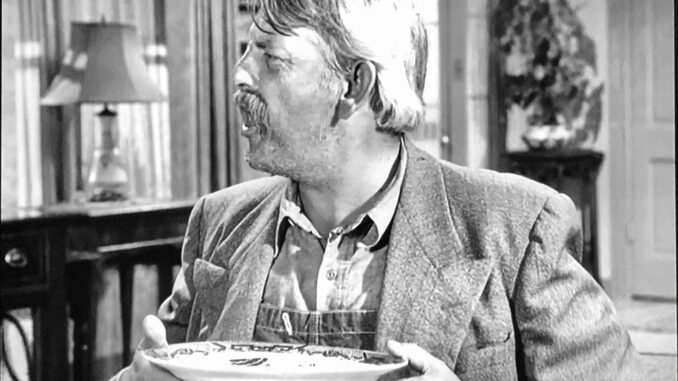
In the tranquil, sun-dappled haven of Mayberry, where common sense often wore a sheriff’s badge and wisdom arrived in the form of a warm pie, there existed a fascinating study in contrasts. On one side stood Aunt Bee Taylor, the very embodiment of small-town civility, her gentle demeanor a thinly veiled steel rod of traditional values and proper comportment. On the other, hailing from the rugged hills just beyond town limits, was Mr. Briscoe Darling, patriarch of the musical mountain clan, a man whose manners were as wild and untamed as the landscape he called home. The very thought of these two disparate souls sharing a space, let alone a lesson, conjures a scene ripe with both comedic potential and profound, understated truth.
The premise alone, "Aunt Bee Teaches Mr. Darling Some Proper Manners," is a delightful absurdity, a clash of two distinct ecosystems. Mr. Darling, accustomed to the free-form culinary style of the mountain – eating with hands, speaking one’s mind at full volume, and treating a communal meal as a primal fuel-up – would find the polite strictures of Aunt Bee’s dining table utterly baffling. Aunt Bee, in turn, with her meticulously set table, her insistence on "please" and "thank you," and her abhorrence of elbows on the table, would face a pedagogical challenge unlike any she’d ever encountered at the bridge club.
Imagine the setup: Perhaps Andy, ever the reluctant bridge-builder between town and country, has orchestrated a diplomatic dinner, a hopeful, if misguided, attempt to foster understanding. Mr. Darling, lured by the promise of Aunt Bee’s legendary fried chicken and perhaps a new audience for his jug-playing, reluctantly agrees to venture into the domestic sphere of the Taylor household.
The moment Mr. Darling crosses the threshold, the lesson implicitly begins. Aunt Bee, a lighthouse on a rocky shore, greets him with her characteristic, unwavering politeness. "Welcome, Mr. Darling. Do come in. Supper's almost ready." Mr. Darling, perhaps wiping his boots on the immaculate rug or neglecting to remove his hat, might offer a hearty, slightly off-key "Howdy, Bee!" before surveying the room with a suspicious eye, as if expecting a wild animal to jump out from behind the antimacassars.
The true crucible, however, is the dinner table. Aunt Bee, ever the gracious host, would present her culinary masterpiece – a symphony of golden-brown chicken, fluffy mashed potatoes, and perfectly cooked green beans. Mr. Darling, accustomed to a more direct approach, might eye a chicken leg and simply reach for it, bypassing the serving spoon entirely. This is where Aunt Bee’s silent, yet incredibly potent, educational technique would come into play. There would be no shouting, no scolding. Instead, there would be the look. A gentle, almost imperceptible raising of an eyebrow, a slight tilt of the head, a delicate clearing of the throat, or the precise, almost theatrical placement of a serving utensil directly into Mr. Darling's line of sight.
"Oh, Mr. Darling," she might say, her voice as smooth as polished wood, "do let me pass you the tongs for that chicken. Wouldn't want to get your hands all greasy before you pick up your fork, would we?" The emphasis on "fork" would be subtle, yet firm, a gentle nudge toward the alien concept of cutlery. Mr. Darling, momentarily bewildered, might grunt, pick up the offending fork like a foreign object, and attempt to spear a potato with the tines facing the wrong way. Aunt Bee, without missing a beat, would demonstrate with her own fork, her movements economical and graceful, an unspoken ballet of proper dining.
The conversational manners would prove an even greater hurdle. Mr. Darling, prone to boisterous declarations and uninhibited storytelling, might interrupt Opie mid-sentence, or launch into a loud diatribe about government regulations on squirrel traps, while Aunt Bee was mid-anecdote about Mrs. Mendelbright’s prize-winning petunias. Again, Aunt Bee’s approach would be one of subtle redirection. "That's certainly a… lively perspective, Mr. Darling," she might interject smoothly, "but I believe Opie was just about to tell us about his new fishing lure. Opie, dear?" Her gaze would fix on Opie, inviting him to reclaim the floor, implicitly teaching Mr. Darling the invaluable lesson of taking turns and respectful listening.
The genius of Aunt Bee’s teaching method lies in its unwavering consistency and her deep-seated belief in the inherent good of people. She wouldn't preach; she would embody. She wouldn't condemn; she would guide. She knew that true manners weren’t about superficial rules, but about respect—respect for oneself, respect for others, and respect for the shared space. She understood that Mr. Darling's lack of etiquette wasn't malicious, but merely a reflection of a different upbringing and environment.
By the end of the evening, Mr. Darling wouldn’t transform into a Mayberry sophisticate. He might still struggle with the napkin, or occasionally bellow rather than speak. But something would shift. He might, almost unconsciously, use his fork to pick up a stray pea. He might, after being gently prompted for the tenth time, remember to say "thank you" for a second slice of pie. Most importantly, he would have experienced a genuine, unwavering kindness that transcended their differences. He might even come to appreciate the quiet order and gentle rhythm of Aunt Bee's home, finding a strange comfort in its civility.
The illustrative essay of Aunt Bee teaching Mr. Darling proper manners isn't merely a humorous anecdote; it's a profound commentary on the nature of understanding and connection. It suggests that even the most seemingly disparate individuals can find common ground through patience, respect, and a generous spirit. Aunt Bee didn’t just teach Mr. Darling to use a fork; she taught him, and by extension, us, that true civility is less about rigid rules and more about the delicate dance of human interaction, a dance that, even with a few missteps, can create unexpected harmony between the wildest mountain folk and the kindest town matron.